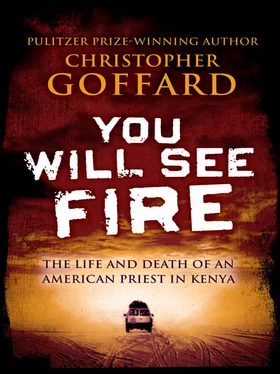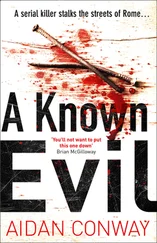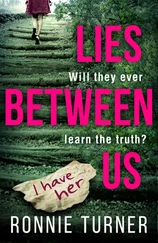As Gathenji saw it, over their years of working together, their bond had evolved into something more profound than mere friendship. They shared the understanding of two colleagues who knew for a certainty that their work could get them killed. They were brothers in a foxhole.
Temperamentally, they were poles apart. Kaiser had a hard-charging, elbows-out approach, always racing toward the cannon’s mouth. Dogged but not personally flashy, Gathenji was quiet, methodical, and preferred to operate behind the scenes. He had a wife and two children. Despite his high-profile battles with the powerful, he tried to speak through his legal work. He saw no reason to draw more attention to himself than necessary.
Many of his peers had cultivated political connections and made themselves rich. He did not view the law as a stepping-stone for political power; to him, his country’s politics had a rank taste. He wasn’t an editorial writer or a maker of screeds and fiery speeches. He seemed to know everybody but made it a point to avoid social clubs. He would not be found mingling with the nation’s legal stars on a Nairobi golf course. He couldn’t be mistaken for a member of the wabenzi class—the Swahili term for those possessed of a Mercedes-Benz, the badge of arrival. He stayed away from bars and made it a habit to be home on his small farm, with his family, well before sunset.
Much of his work, championing the victims of political violence, carried small financial reward. And so despite being one of his country’s best attorneys, he labored in what he characterized as the lower-middle class. He described himself as a simple man, a working lawyer with a Mitsubishi and, when he could afford it, a clerk. He thought of himself as a foot soldier, and had the instincts of a survivor.
For years, he had worked from a respectable fourth-floor office in a tower across the street from the Central Law Courts in downtown Nairobi, but the place had stopped feeling safe a year back; one of Moi’s ministers had moved into the floor below, and Gathenji nervously found himself passing the man’s security detail in the stairway.
Now, in the summer of 2000, he was in semihiding in an old, peeling, out-of-the-way office bungalow on Chania Road in a compound of decrepit trees and flowers. The red-tiled roof leaked when it rained, and the cold days were bitterly uncomfortable. He had removed his name from the telephone book and changed his numbers. He was doing mostly low-level legal work to make a living—most clients had deserted him after his incarceration as an alleged enemy of the state a few years back—and quietly consulting human rights groups on strategies for prosecuting Moi.
To Gathenji, Kaiser’s death had the feel of a classic state-sanctioned hit, carried out by a cadre of professional assassins. It was the work of what he called “Murder, Inc.”—a vast apparatus of spies, security forces, and hit men with links to State House. Could Moi have been brazen enough to kill the American? If so, it meant anyone might be next; it suggested there might be a list the assassins were working from. His own name could plausibly be on it; many of the calls he would receive in coming days were from people concerned for his safety.
The country was two years away from the most important election in its postindependence history, a potential pivot point in East Africa’s rueful political trajectory. There was hope that Kenya’s fragmented ethnic groups might finally do what had seemed impossible before, coalescing long enough to defeat Moi’s machine. The ruler was apparently growing desperate, his grip threatened as never before.
SIX DAYS AFTER Kaiser’s death, as the priest lay in a glass-lidded brass-and-teak coffin under the vault of Nairobi’s Holy Family Basilica, Gathenji sat in the crowded cathedral among Catholic bishops, human rights activists, diplomats, and the priest’s friends and colleagues from across the country. The anger in the air was palpable. Gathenji listened as the papal nuncio—the man who’d issued Kaiser’s final summons to Nairobi—stood before the crowd, extolling the American priest’s crusade for justice and declaring him a martyr to the faith. In life, he’d been a troublemaker, an obstinate and single-minded man who’d railed against the Church’s passivity and clashed with his bishops, his missionary bosses, his fellow priests. Now it was possible to ignore the rough edges and complicated history.
The transformation had been instantaneous: The priest had been rubbed as smooth and flawless as a Masai bead, delivered from his aching body and messy humanity to abstraction, a clear and perfect symbol. After twenty-two years of Moi’s misrule, Kenyans were ready for such a symbol. The president’s face stared from every shilling in their pockets and the wall of every shop they entered—his name was on schools, streets, stadiums—and they had no trouble envisioning his hand steering the American priest to his grave. On everyone’s lips was a litany of political murders, unexplained car wrecks, implausible suicides. Outside the basilica, thousands crammed the streets in mourning and in rage. The American had already become a byword for Moi’s ruthless determination to stamp out dissent, and a rallying cry for the forces gathering against the dictator. Gathenji noticed that the regime had sent no representative to the funeral ceremony.
After the Mass, the priest’s body was loaded into a church van for transport to Kisiiland in the west, where Kaiser had spent decades, and then on to the gravesite in his last parish, in Lolgorien.
Gathenji did not follow the church caravan; there was no telling who might be waiting to ambush him on those long stretches of country road. His association with Kaiser was well known. He believed it best to lie low until facts could be gathered, the scope of the plot uncovered, the killers identified. On this score, there were grounds for hope far beyond what anyone could have expected. A team of FBI agents, summoned by the U.S. ambassador, Johnnie Carson, had crossed the Atlantic to begin investigating. Even now they were fanning out across the countryside, gathering evidence, digging up witnesses.
The ambassador had promised the Bureau’s investigation would be an independent one. To Gathenji and to others, this was a crucial reassurance, since no rational person expected the slightest help from the Kenyan police themselves; it was widely rumored that they’d played some role in the death.
Gathenji was heartened by the FBI’s reputation, by its awesome resources and name for professionalism; the agency had been instrumental in rounding up suspects in the terror bombing of the U.S. embassy in Nairobi two years earlier.
But even now, a piece of not-so-distant history supplied grounds for anxiety. A decade earlier, Moi had invited New Scotland Yard in to investigate the murder of his foreign minister, Robert Ouko, but had curtailed the probe when it pointed to members of his inner circle. The investigation had supplied the illusion of the pursuit of justice while anger abated and memories faded and witness after witness died, some of them mysteriously.
No, Gathenji thought. This investigation was in good hands. The Kaiser case would not be like Ouko’s. The Americans wouldn’t permit themselves to be Moi’s dupes, and they would raise hell if they were trifled with. So seriously was the case being treated in the United States that senators there were taking to the floor of Congress to demand justice for Kaiser.
Gathenji’s day-to-day work representing victims of political violence was dangerous enough, and the Kaiser case promised even deeper hazards. He did not think it prudent to venture too soon to the crime scene in Naivasha, a closely surveilled area with a reputation as a regime stronghold, where the slightest political talk could easily be overheard.
Читать дальше












